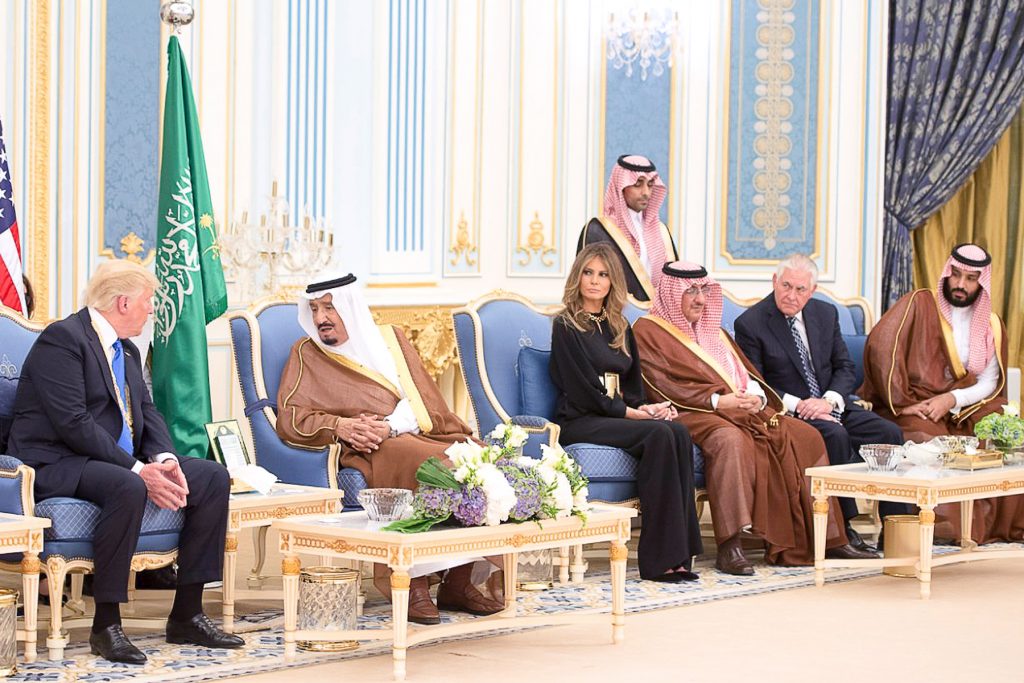Donald Trump just signed a deal worth $110 billion to sell weapons to Saudi Arabia. He’s saying it’s the biggest arms deal in history and really good news for the US economy.
Trump’s aide Gary Cohn told reporters the deal represented “a lot of money. Big dollars. Big dollars.”
Thanks for clearing that up Gary. The deal will see US manufacturers make and sell weapons, including “tanks and helicopters, ships, intelligence-gathering aircraft, a missile-defense radar system, and cybersecurity tools”. The deal is worth $350 billion over the next ten years, $110 billion of which will come through immediately. Trump’s team has said the deal could create tens of thousands of US jobs.
The term ‘arms deal’ sounds like something from a James Bond movie – long-haired white cats, spinny desk chairs and briefcases – but in reality it’s just another way for a government to make money.
It's just like any other trade agreement...
Individual companies are involved in negotiating these agreements – one of the US' biggest defence companies, Lockhead Martin, said it was 'proud' to have $26 billion of its own equipment as part of the deal.
But at the end of the day, arms deals are between governments, not companies. The company may be manufacturing the product, but it's the US government that sells them.
But in industries that are important to the US economy, the government is likely to be more involved. And the arms trade in particular is big business – weapon sales between 2012-2016 was at its highest since the start of the 1990s and the US is the largest exporter, supplying 100 countries round the world, more than any other nation. The US has some of the biggest weapons manufacturers, and puts a lot investment and expertise in the industry.
… moving resources from a country that produces them to a country that wants them
Obviously, companies negotiate their own international trade agreements all the time – but governments are often pretty actively involved too. So meetings between heads of state like Trump and the Saudi King are about a lot more than just shaking hands.
A few countries dominate the global arms trade – the US is responsible for a third of arms sales, Russia sells 23 per cent.
Saudi Arabia – the country which Trump just sold all the arms to – imports the second highest amount of weapons of any country in the world, after India.
India receives most of its arms from Russia, while Saudi Arabia relies on the US and UK.
Arms deals between countries have a lot to do with the political relationship between those governments. The US, for example, won’t sell weapons to Iran, or Vietnam.
But, being bombs and guns, the arms trade is more complicated than, say, manufacturing cars
Donald Trump is arguing that the deal is a win win for the two countries – it’s good for the US economy, and helps contribute to stability in Saudi and Yemen.
The problem is, not everyone agrees with that second bit. The conflict has caused a really high number of civilian deaths – which caused Obama to scale back the US support for the campaign.
Saudi Arabia is currently involved in military intervention in Yemen – so you can presume that these US made weapons will be used in that war. Saudi Arabia now owes the US $350 billion worth of business over the course of the next ten years – which means that even if the Saudis think of a way to end the conflict, say, next year, they’ve agreed to buying all these guns and bombs now – and the US won’t be too keen on helping negotiate peace before they’ve got their cash either.
So Trump might see this is just about 'strengthening a relationship' – but it sounds a little more like he's mainly out to chase down a buck.

